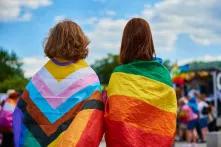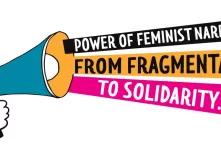The second webinar in this series delved into the normalisation of the violation of bodily autonomy and self determination. It also explored the intersections and possible overlaps between feminism and intersex activism and the possibilities of building bridges between both these human rights movements. Through the discussion, the participants were engaged through a Zoom poll, Mentimeter and Padlet.

In a disabling society, cross-movement solidarity is of crucial importance, for living with safety, security, and dignity as well as for switching narratives which gain dominance.
- Dan Christian Ghattas
Feminism and the Intersex Rights Movements are historically rooted in the struggle against gender oppression and the denial of individual identity. They both occur in and are shaped by the patriarchal social mores that dictate norms and expectations which are backed by stereotypes. Both these movements represent the fight for survival and complete lives in an atmosphere that is permeated by a binary viewpoint. There are also intersections between female genital mutilation and intersex genital mutilation. However, even despite this, they are both perceived as movements that are exclusive of each other. As a movement, the Intersex Rights Movement has thrived because of its collaborations, such as with the regional LGBTQIA+ organisations. It is now also attempting to find allies within the Disability Justice Movement in Europe, since they both focus on healing from ableist trauma. Perhaps it is imperative for feminists world over to realise and act upon this interconnectedness of movements because when the rights of one group are expanded, those of all others are also expanded. Feminism thus, becomes a movement for the liberation of all sexes.
The second webinar, held on 14th February, delved into the power of activism for human rights in the context of the joint fight for bodily integrity and self-determination. Dan Christian Ghattas, The Executive Director of Organisation Intersex International Europe, and Jeevika Shiv, the co-founder of Feminist Manch (an independent Feminist Action Research Initiative to strengthen the leadership of young women, girls, and gender-diverse people in feminist policy advocacy), participated in this discussion. It was moderated by Vandita Morarka, the Founder and CEO of One Future Collective.
Information as a tool for narrative building
One of the most striking aspects that was fleshed out in this discussion was the significance of information as a tool for liberation since it directly impacts narrative building. It is undeniable that information has incredible potential for forming and reforming norms. It is also increasingly recognised that data and information can also be key drivers of social justice movements.
Dan highlighted that particularly in the context of intersex people, most information available is medical and pathologized. This translates into the ‘othering’ of intersex people and their treatment as anomalies in society. For achieving true feminist solidarity, marginalised and vulnerable people will have to be treated and addressed as ‘whole and complete’ individuals and included as ‘one of us’. This was best captured by Dan as,
“Intersex people are not the other. Society has managed to silence and invisibilise intersex people.”
Jeevika highlighted further that ‘information is power’ and it must hence be engaged with through the lens of power. Even to access one’s bodily integrity or be exposed to these concepts, the information that one receives is crucial in shaping their perceptions, particularly of people in the ‘moveable middle’ as highlighted by the panellists of the first webinar (web article 1 can be referenced here). It is indeed this information that fosters and replicates existing power dynamics and deepens the cleavages within society. Perhaps some questions to consider while using and creating information are- Whose information and disinformation are being used? Does this information reach networks and populations that tend to not have access to information? Are the people whom this information is about, involved in its creation and distribution? Who does the information serve and what is the scope of its manipulation? What are the existing biases in this information? What do I intend to do with this information and what does it change? Therefore, for making leadership of those most impacted, information must be centered around people instead of being centered around them.
The significance of bodily integrity
Expressing and accessing bodily integrity can have an immense ripple effect. Claims to people’s bodies are made by various stakeholders, sometimes even before birth and so the body too is a social construct. Bodies are scrutinised on the basis of pre-existing plans that have been developed for them. This is exacerbated in the digital space which serves to replicate and reproduce existing exclusionary practices, since its control is heavily guarded. As Jeevika highlighted,
(In the context of expression and access of bodily integrity within the backdrop of historical exclusion) The increased digitisation also influences what data is recorded and thus what information is accessed.
At its core, the demand for bodily autonomy hinges on self determination. It also encompasses privacy, consent, access, basic safety, safety from violence, unpaid care work and work, and the exercising of choice. The necessity of this is further aggravated in the context of body mutilation, which is an infringement that people across genders could have experienced. Even in the Western context, the intersections within coloniality have prevented the recognition of Intersex Genital Mutilation as a harmful practice. The fight for bodily autonomy and self-determination is thus not limited to only intersex people, but must be extended to cis-gendered people as well. However, it is still a challenge to engage with people on genital mutilation. Does then, our silence and avoidance mean that we do not care if our loved ones face it?
Bodily integrity is in fact rooted in centering consent by foregrounding that a person’s body belongs to them only and that only they have decision making power over it. Consent here refers to the choice made by oneself and thus must not be conflated with authorisation which may be given by family members, for instance. However, this is further complicated by the social reliance on medical infrastructure which may rely on outdated knowledge and information.
Building collective narratives
The lack of systemic protection causes most harm to marginalised people whose lives are continually jeopardised by multiple forces that devalue, criminalise and even go so far as to erase identities. The existing misconception surrounding human rights treats what happens to people as only a symptom of the problem instead of viewing it as the root cause. There may also be competition in order to prove one’s marginalisation to this end, which they described as the ‘pressure olympics of who is marginalised more than the other’. Questioning the binaries embedded by the dominant majorities is a lifelong movement for marginalised people that they must fuel in order for their very survival. This too can take multiple forms depending on the context, those leading the movement to determine the most effective tool of narrative building. Jeevika traced back to storytelling as an effective means of conveying information and ownership by those most impacted. The power of collectives derives from storytelling, which is crucial for mainstreaming narratives. To further bolster their thought, Jeevika shared a powerful anecdote. She explained that the tribal women she had worked with previously used storytelling through songs not only as a means to get their voices heard at the panchayat (local self-governments in rural India as opposed to the more ‘formal’ systems of governance such as the municipalities in urban and suburban regions) but also to occupy seats at the decision-making table. This significant acknowledgment from policy makers serves as an important step toward policy-level change.
Vandita reiterated this by highlighting that,
It is important to meet people where they are at (in terms of their journeys in social justice) instead of expecting them to meet us where we are at.
In closing, the panellists also weighed in on how feminist accountability can manifest as a framework for building movements to oppose systemic oppression and violence. Most famously explored in Ann Russo’s ‘Feminist Accountability: Disrupting Violence and Transforming Power’, accountability is envisioned as a framework for strengthening the feminist movement through anti-racist work, community accountability, and transformative justice. It was agreed that public scrutiny and participation would be essential for influencing political spaces for marginalised people. Misogyny, homophobia, transphobia, and ableism are all part of intersex phobia and discrimination. To quote Jeevika in this regard,
Non-binary arguments, by their very nature emphasise oneness and are rooted in democracy and non-othering. Hence movements need to collaborate more.
This also connects to the necessity of adequate resources for movement building praxis to visibilise and remain accountable to the larger feminist movement. Additionally, there is a need to radically change the narratives around intersex people for them to be truly recognised as one with the feminist movement. We must move towards a world where we can talk about intersex people as people and not just a vote bank. These are people we know, we come across in public spaces, eat with, travel with, study and work with.
But, do we even have the language to talk of and talk about intersex people? Does the very way we talk about them ‘other’ them? What are some ways we can break free from the culture of silencing and move towards true feminist solidarity? The panellists also briefly touched upon how the creation of language is feminist praxis because it visibilises that which has been deliberately concealed and neglected. By acknowledging the wholeness of individuals, language supports the breaking away from this culture of silencing. This feminist praxis is also reflected in OII Europe’s ‘InterVisibility Project’ wherein they launch open-access resources and information in translation across 32 languages, so that intersex people and our communities have the vocabulary to speak for and about intersex people. Language, thus reclaimed, also becomes a decolonising tool. You can find this resource here.
The discussion was held primarily in English with the facility of interpretation in Spanish since the panellists and participants participated in the discussion from across the globe. This was also in full cognisance of the fact that interpretation might prove inadequate in translating experiences and/or context-specific realities accurately.
Resources mentioned during the discussion
1. Protecting Intersex People in Europe: A toolkit for law and policy makers
2. OII Europe Campaign #MyIntersexStory - personal accounts by intersex people living in Europe


